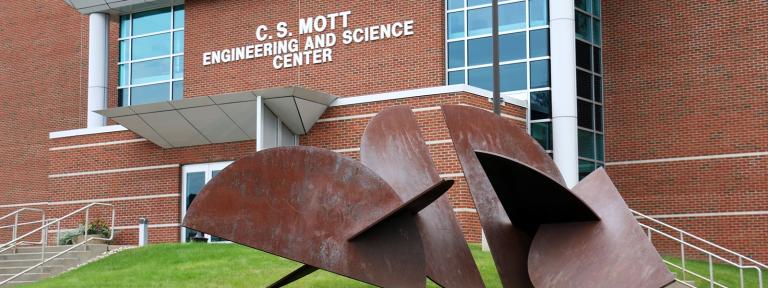
Broken shredder discs and oil pumps are all part of the lesson in Dr. Echempati's MECH-312 Machine Design class.
The "real world" is always an element of the educational process at Kettering University, where students alternate three months of classes with three months of cooperative education employment related to their field of study. The "real world" became the educational process in Dr. Raghu Echempati's MECH-312 Machine Design Course last semester.
Echempati, associate professor of Mechanical Engineering, integrated "field problems" to supplement the theory and concepts taught in the class. The problems presented by Echempati included the design of the bolts used to hold up light poles in the parking lot, fuel pumps and fire extinguishers, to name a few. In all, he assigned 10 different "mini projects" and a final design project. Some of these mini projects were assigned for extra credit opportunity.
"The students were excited by this approach," said Echempati, "they began bringing in a variety of "broken" engineering components they found on their own, to work on for their final class project."
Two such students were Josh Richardson, of Onsted, Mich., and Jeff Beaudoine, of Alpena, Mich. Jeff brought to class a broken cutter disc, part of an industrial shredding machine from his co-op employer Amos Manufacturing.
"We want to determine how it failed and how much force it took to break it," Richardson said. The two used formulas learned in class to analyze how many ways the disc could have broken depending upon rotation, side load stresses and maximum force.
"These shredders process nine tons of paper per hour," said Beaudoine, "this was the first disc to break inside the machine." Beaudoine may use the broken disc as the basis for an evaluation of the entire shredding machine for a senior project.
John Foss, of Auburn, Wash., also brought in his own broken part for analyses. Unlike Richardson and Beaudoine, his was non-work-related. Foss pulled a broken oil pump out of his '88 Pontiac Fiero to perform calculations to determine why it failed.
"One of the things I've learned from this class is to recognize when the manufacturer has chosen the wrong materials," said Foss. He said he liked that the class was open-ended, "not all problems presented in class have a unique answer. The collective knowledge of the students is beneficial too," he said, referring to the variety of projects students brought to class to analyze.
"One or two of the components students brought to class were quite new to me," said Dr. "E" (as the students call him), "I am learning a lot from the students, which has always been part of my mission as an educator. There is a vast amount of knowledge to be found among these young and enthusiastic students. All it needs is for a teacher is to open the doors for these young and creative students to feel secure to share their experiences with the class."
Written by Dawn Hibbard
810-762-9865
dhibbard@kettering.edu